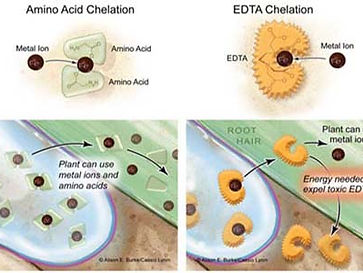
High technology for organic farming
With a team of research experts in Germany, Russia, the United States of America, the technologies that Tenabio LLC develop and apply on its products are the latest and most effective technologies for plants and animals. , researched and proven worldwide.

FOLIAR NUTRITION
NANO technology brings the ability to lead agriculture in a microscopic size. In addition, many potential benefits such as improving food quality and safety, reducing input costs, enriching the absorption of nutrients, etc. allow the application of NANO technology to become a comprehensive solution. for modern agriculture. Using nanomaterials in agriculture reduces chemical abuse, minimizes nutrient loss during fertilization, and increases yields through pest and nutrient management.
CHELATE TECHNOLOGY
Chelates are compounds that add nutrients that are easily absorbed by plants, especially micronutrients and nitrogen.
Many trace elements are positively charged as ions in solution, while holes or openings in the roots and leaves are negatively charged. The ions of this element are hardly absorbed into the plant by the affinity of the negative charge of the positive charge. Thanks to chelation, positive ions are linked to short-chain organic polymer molecules, becoming isoelectric, making it easier for plants to absorb microelements.
Fertilizers applying Chelate technology will be hundreds of times more effective than inorganic micronutrients, environmentally friendly, safe for people, plants and animals.

Microbiology TECHNOLOGY

Microorganisms have great roles and effects for the agricultural industry, both in the crop and livestock industries, with outstanding advantages as follows:
- Helps balance the ecosystem in the soil in particular and the environment in general.
- Improve the physical, chemical and biological environment of the soil.
- Contribute to increase fertility and kill pathogens and pests to the soil.
- Helps to store and produce water
- Helps store nutrients.
- Increase productivity and quality of crops and livestock.
- Kill harmful insects. Reduce diseases and contribute to increased resistance. Increase the resistance of plants and animals to adverse conditions.
- Able to decompose and transform biological waste, agricultural and industrial waste. Contributing to clean up the environment.

